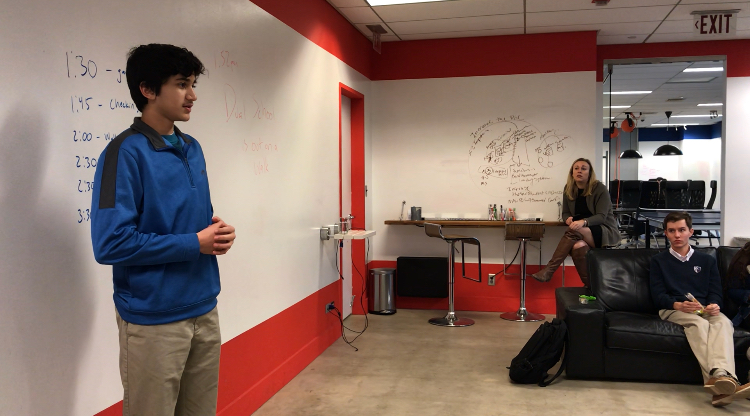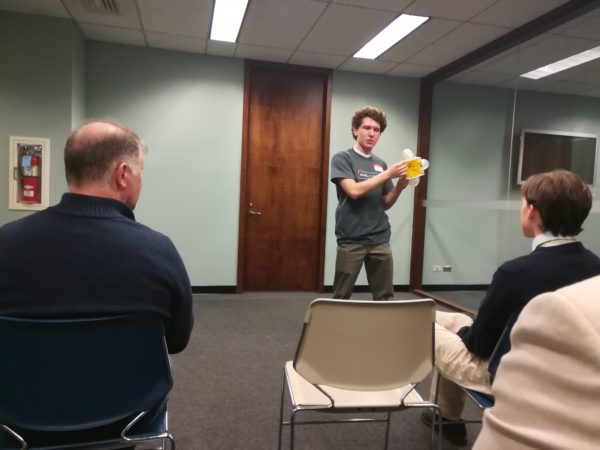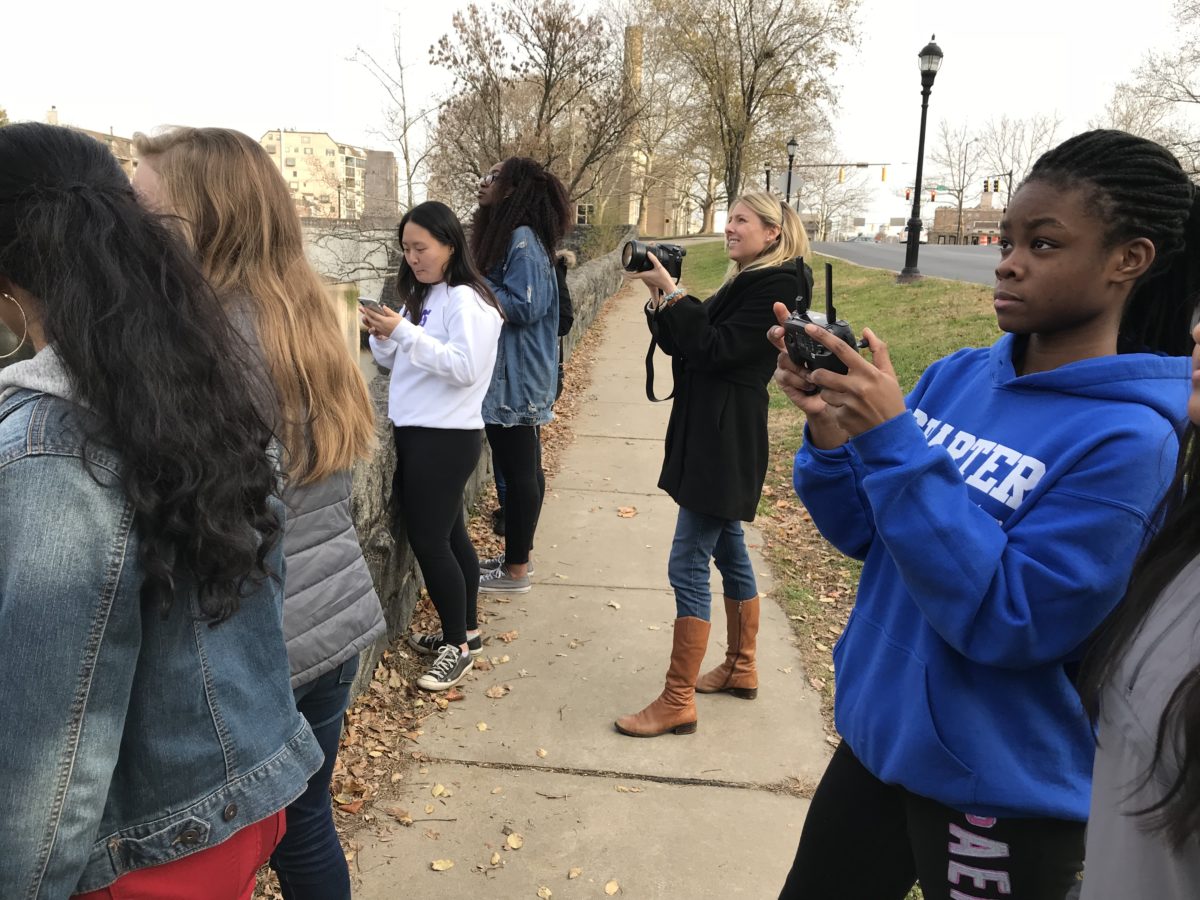You may not have heard of Dual School, the newly-nonprofit idea incubator for high-schoolers that meets at 1313 Innovation on Tuesday afternoons, but it’s a big deal.
“Built by high school students, for high school students,” the program’s prototype launched in October through a partnership among San Diego charter school High Tech High, the University of Delaware’s Horn Program in Entrepreneurship and local coding nonprofits. The 10-week pilot program encourages hard- and soft-skill development in coding, critical thinking, program design, project management and entrepreneurship.
For those unfamiliar with High Tech High, it’s an innovative education model that was the subject of a 2016 documentary, Most Likely to Succeed.
The project-based learning schools serve a diverse body of over 5,000 K-12 students in the San Diego area, and focus on personalized learning, equity and collaborative design. High Tech High first opened in 2000, pioneering an education style that breaks away from the rigid system of classes that have been the standard since the Industrial Revolution.
That Brian Delgado and Adam Borek, founding teachers at High Tech High, took an interest in Delaware’s Dual School is a source of pride for Interim Director Zachary Jones.
“We’re lucky to have Adam and Brian as consultants and thought partners throughout this experiment,” Jones said. “They’ve been instrumental in pushing our thinking around how and why we do the things we do at Dual School.”
Delgado and Borek have visited Dual School three times so far, working with the first batch of students for special project days and helping further develop the program with Jones and the program’s other leads, Catherine Lindroth (director of the award-winning SummerCollab) and Meghan Wallace (former education policy adviser for Gov. Jack Markell and cofounder of Mary Ann’s List).
“The best part is, they think what we’re doing is pushing the boundaries of what’s possible,” said Jones. “As educators on the edge, they think we’re building a critical part of the future.”
Experiential learning isn’t just a growing trend, it’s the kind of learning that could possibly shape the future of education. Dr. Wendy Hirsch Weiner is principal and curriculum developer of Conservatory Prep Schools, a school for experiential learning in South Florida.
“This type of experiential learning allows the student to develop a sense of purpose and determine where he or she is lacking in knowledge and skills,” said Weiner. “As educators, we want students to learn specific skills to be successful in life, but all too often, the context of the skills have little interest to the student. When the students are vested in a project, developed and guided by them, only then will true learning take place.”

The students in the pilot program come from a variety of backgrounds, fulfilling one of its missions — to create a diverse setting of public, private, magnet and homeschool students working together.
“Some of the students have told me they’ve never been in a group like this, with kids from different backgrounds,” Jones said. When I visit one Tuesday before the holiday break, they look like a group of longtime friends hanging out eating burritos on 1313’s colorful couches.
Many of the students in the pilot program first heard about it through Schoology, a popular online education management system used by many area schools, where administrators put out posts encouraging them to apply. Interested students had to come up with a problem or issue they wanted to tackle with their individual project.
The projects are as varied as the kids.
- Saiwaa Antwi is a student at Freire Charter School who worked as an operations specialist last summer for SummerCollab. Her focus is on financial literacy for low-income communities. “I grew up with a single mom, and sometimes it was financially hard,” she says. Her program, tentatively titled Secure the Bag, has been prototyped twice so far as an after-school program.
- Rohan Kanchana of Newark Charter School has been teaching himself coding since the sixth grade. He landed on a project to make career surveys for high school students more accurate. “I know someone who’s really into marketing,” he said. “The survey matched him with agriculture.” Kanchana’s web platform uses artificial intelligence (also self-taught) to process natural language for a better result.

- Adé Robertson goes to William Penn, where a new Innovation Center may soon be a second homebase for Dual School. She’s interested in social justice and is focusing on mental health in the school system, a topic that has certain limits. Recently, she had the opportunity to meet with Delaware Representative Valerie Longhurst. “I began to see that how schools are dealing with mental health is a pretty widespread issue, especially making sure schools have certain policies in place to help their students,” she said. “I’m seeing that for many schools having the policy can only do so much if the resources are not being utilized by the students. I believe that it would be best to put a program in place in my school to show students that it is OK to reach out for help.”
- Nabiha Syed of the Charter School of Wilmington wants to eradicate the tampon tax and erode the stigma that allows 37 states to tax tampons as “non-essential” items. Her project is part awareness, part advocating for legislative action. “I made an awareness video,” she said, “talking people on the street about it.”
- Michael Wiciak of Salesianum is engineering a rotorless drone. He got the idea after reading about a toddler who lost an eye in an accident involving a toy drone. Wiciak used a 3D printer to create prototypes inspired by Dyson’s bladeless fans.

All of the projects (including one by Technical.ly Delaware guest contributor Miracle Olatunji) were presented at a special TEDx event Jan. 30. Each student stood before packed conference rooms at 1313 Innovation to lead breakout sessions where they gave a 10-minute talk about their projects — not unlike a startup pitch.
And, in fact, if these high-schoolers stick which their projects for the long haul (or even if they use the what they’ve learned to move in a new direction), they’ll be pitching to investors before long.







